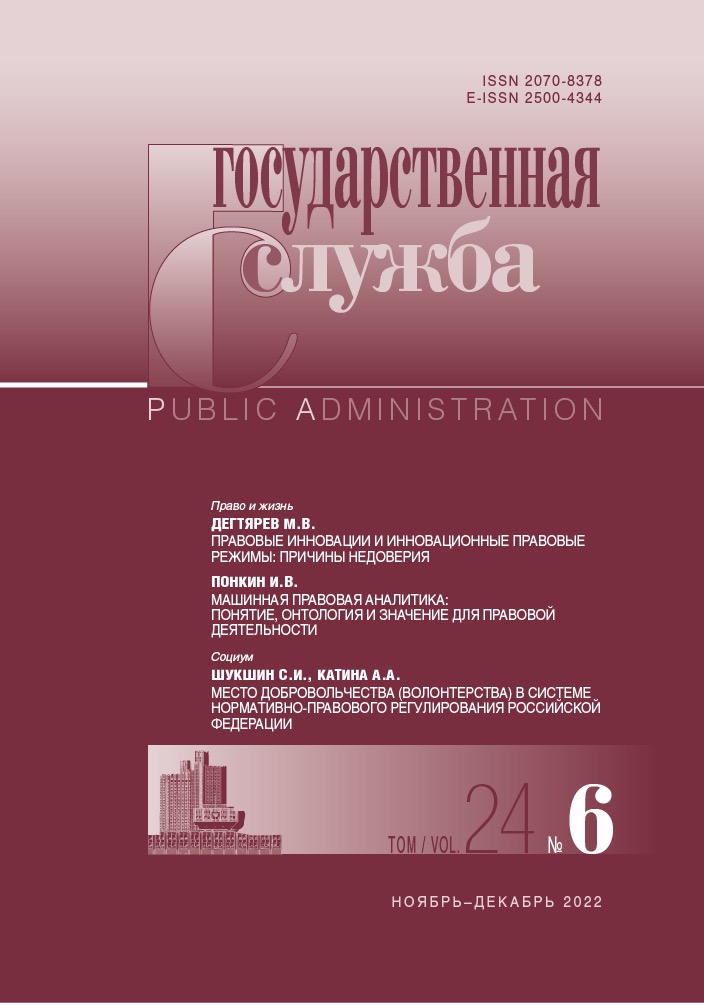Recommended link to article:
MIKHAIL VLADIMIROVICH DEGTYAREVа
аGovernment of the Khabarovsk Krai
DOI: 10.22394/2070-8378-2022-24-6-30-34
Abstract:
Strategic planning in the areas of legal support, public administration, and public service improvements provides for the new legal technologies while there are still massive failures being registered. The author raises the question of the necessity to find the reasons for such disruption not only in insufficient discipline or qualifications of public officials but also in the specific ontological peculiarities inherent in the law and legal work. In the course of the work, the author analyzed international experience, as well as relevant practice in Khabarovsk Krai in 2020– 2022. The article applies scientific methods of analysis and synthesis, induction, deduction and abduction, formalization, classification, modeling, etc. In the paper, we can see the author’s definition of an «innovative public law regime». In addition, the author outlined and explained the determinants of distrust and avoidance by private law firms (legal departments of corporations) and legal departments of public authorities to adopt, implement and apply legal innovation in current or projected legal work. The regulatory environment is adaptive in nature (although there are objectively determined limits of such adaptability). The introduction of legal innovations is primarily associated with issues of thoughtfulness, intensity and scale, as well as the effectiveness of validation. Over time, the regulatory environment becomes more complex and heterogeneous, and this trend becomes more pronounced, while having a non-linear, exponential dependence. At the same time, the impact of technology on law and legal work, which is still poorly understood and explained, gradually creates the prerequisites for future tectonic changes in the nature and ontology of law, in regulatory landscapes.
Keywords:
innovative public law regime, innovative legal technologies, experimental legal regime, experimental legislation, legal theory, administrative law
Received:
October 31, 2022
References:
Aristov E.V. New regulatory technologies and other harbingers of the law of the future. Ex Jure. 2022. No. 2. P. 8–18. In Russian
Baranov V.M., Lavrentiev A.R., Trusov N.A. Independent anti-corruption expertise in Russia: an unsuccessful experiment. Gosudarstvo i pravo. 2022. No. 1. P. 110–119. In Russian
Drago R. Administrative science. Translated from French by V.L. Entin; edited and with an afterword by B.M. Lazarev. Moscow: Progress, 1982. In Russian
Ponkin I.V. Military analytics. Military applications of artificial intelligence and numbers / Consortium “Analitika. Pravo. Tsifra”. Moscow: Buki Vedi, 2022. In Russian
Ponkin I.V. Theory of public administration: the content of the concept of «Order». Administrativnoye pravo i protsess. 2016. No. 11. P. 8–10. In Russian
Ponkin I.V. Entropy, negative entropy and order in the public administration and in law. Pravo i obrazovaniye. 2016. No. 9. P. 11–20. In Russian
Ponkin I.V., Lapteva A.I. Law and digit: machine-readable law, digital twin models, digital formalization and digital onto-engineering in law: textbook / Consortium “Analitika. Pravo. Tsifra”. Moscow: Buki Vedi, 2021. In Russian
Ponkin I.V., Redkina A.I. Digital formalization of law. International Journal of Open Information Technologies. 2019 Vol. 7. No. 1. P. 39–48. In Russian
Articles in Open Access mode are published under the Creative Commons Attribution 4.0 International (CC BY) license.

